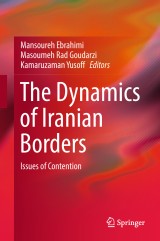Details

The Dynamics of Iranian Borders
Issues of Contention|
90,94 € |
|
| Verlag: | Springer |
| Format: | |
| Veröffentl.: | 15.06.2018 |
| ISBN/EAN: | 9783319898360 |
| Sprache: | englisch |
Dieses eBook enthält ein Wasserzeichen.
Beschreibungen
This book is on Iran’s geopolitical importance representing a continuum of international competition for political gains and economic benefit, due to the country's unique geographical location that has always been a cause of contention. Iran’s massive boarders and evolving political weakness, along with influences from the kings of Qajar that maintained and strengthened Great Britain’s hegemony in the region, were major factors affecting ongoing regional conflicts. Additional roles played by other world powers such as France, Russia and the United States are also noted. Conflicts, unrest and regional wars were all consequences arising from power struggles that led to treaties and international agreements between Iran, Britain and Russia that caused the eventual loss of traditional Iranian territories. Hence, extrinsic impositions on Iran are the subject of this study as authors examine the turbulent climate that altered Iranian borders during the Qajar Dynasty.
Introduction: The Russian Heartland vs. The British World Island.- On Iran’s Eastern Borders: Origins and Consecutive Treaties with the British During the Nineteenth Century.- Origins of Conflicts between Iran and Iraq.- Energy Resources of the Caspian Sea: Role of Regional and Trans-Regional Powers in its Legal Regime.- Evolution of the Post-Soviet Caspian Sea Legal Regime.- The Separation of Bahrain from Iran.- Conclusion: The Geopolitical Struggle for Iran, Central Asia and the Caspian Sea Basin.
This book is on Iran’s geopolitical importance representing a continuum of international competition for political gains and economic benefit, due to the country's unique geographical location that has always been a cause of contention. Iran’s massive boarders and evolving political weakness, along with influences from the kings of Qajar that maintained and strengthened Great Britain’s hegemony in the region, were major factors affecting ongoing regional conflicts. Additional roles played by other world powers such as France, Russia and the United States are also noted. Conflicts, unrest and regional wars were all consequences arising from power struggles that led to treaties and international agreements between Iran, Britain and Russia that caused the eventual loss of traditional Iranian territories. Hence, extrinsic impositions on Iran are the subject of this study as authors examine the turbulent climate that altered Iranian borders during the Qajar Dynasty.
<p>A multidisciplinary contribution to border studies from a primarily historical perspective</p><p>For readers interested in border studies, legal disputes, and conflicts between Iran and its neighbours</p><p>For academic specialists, university students and a wider public interested in Iranian history and on border issues and disputes in West Asia</p>
Diese Produkte könnten Sie auch interessieren:

Der erste arabisch-israelische Krieg und seine Folgen für die Palästinenser

von: Dean Sánchez Pedregoso

15,99 €

Chinas Soft Power Strategien und dessen politische Entwicklung anhand der der Olympischen Spiele 2008 und 2022

von: Alexander Kuhn

15,99 €















